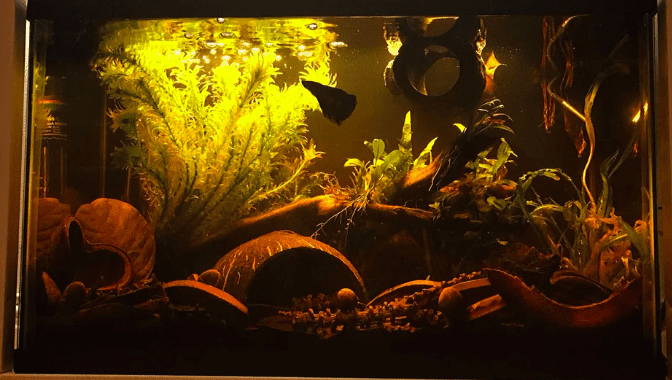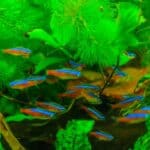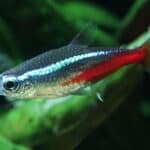Bettas are a popular fish for aquariums, and there is much debate over the best way to care for them. Some people say that bettas prefer blackwater, while others claim that they do just fine in regular tap water. So what’s the truth? In this blog post, we will take a closer look at the benefits of blackwater and whether or not Bettas truly prefer it.
Do Bettas Like Blackwater?
Yes, bettas are naturally found in slow-moving, murky waters with very little dissolved oxygen. In fact, they are often found in rice paddies and stagnant ponds in Southeast Asia.
These blackwater environments contain more tannins and other dissolved organic materials, which give the water its signature dark color.
Tannins are known to be beneficial for bettas, as they help to reduce stress and promote a healthy immune system. Blackwater also contains more natural bacteria, which can help to keep your betta’s tank clean and free of harmful ammonia buildup.
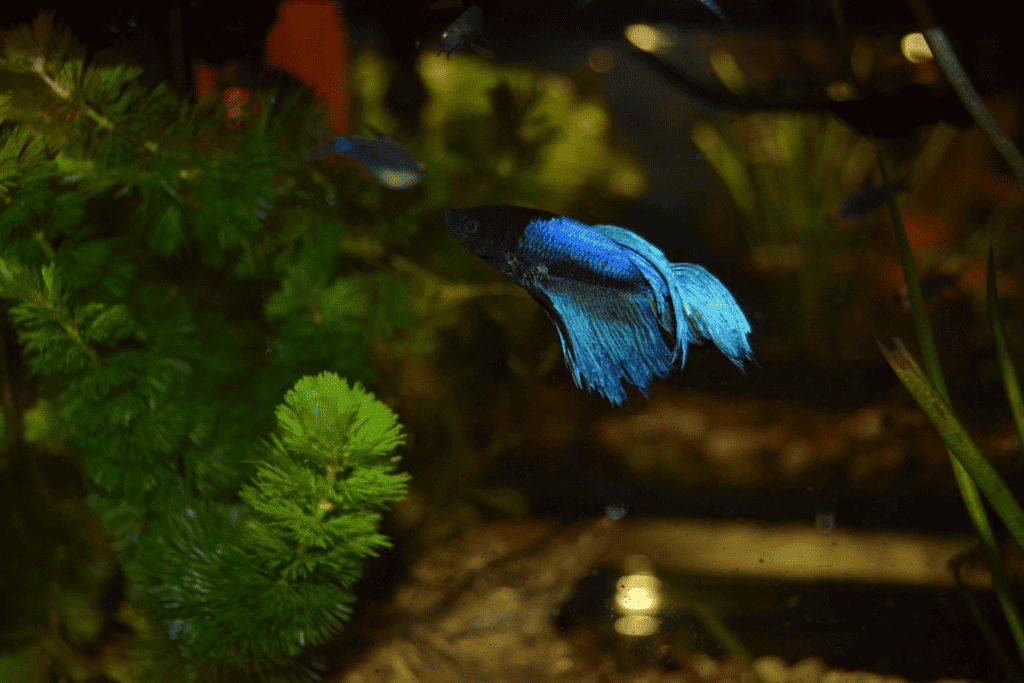
How to Create Blackwater Tank for Betta?
If you want to give your betta the benefits of blackwater, there are a few different ways to do so…
1. IAL
The most common way is to add Indian Almond Leaf (IAL) to your betta’s tank. IAL is a natural source of tannins and other beneficial compounds that will help to recreate the blackwater environment.
You can choose to add the whole leaves or make a tea out of them by boiling them for 15-20 minutes and then adding them to your tank.
IAL is amazing for creating a blackwater environment that your bettas will love! It’s even known to heal open wounds, promote fin and tail growth, reduce stress, and boost the immune system.
2. Driftwood
Another way to give your betta blackwater is to add driftwood to the tank. Driftwood will release tannins and other compounds into the water, giving it a dark color.
Be sure to choose driftwood that is safe for aquariums and rinse it well before adding it to your tank.
3. Extracts
There are also blackwater extracts available that you can add to your tank. These extracts contain tannins and other beneficial compounds that will help to recreate the blackwater environment.
Be sure to follow the instructions on the bottle, as too much extract can be harmful to your fish.
Do Bettas Need Blackwater?
No, bettas do not necessarily need blackwater to thrive. In fact, most bettas that are kept in home aquariums do just fine in regular tap water with a filter. Using blackwater is an underused method that not many betta owners are following.
However, some bettas may benefit from the addition of blackwater to their tank. Blackwater can help to reduce stress and promote a healthy immune system. It also contains natural bacteria that can help to keep your betta’s tank clean.
Will Plants Grow in Betta Tank with Blackwater?
Yes, there’s no need to worry about your plants when adding blackwater to your betta’s tank. This means you can still have a beautiful and natural-looking aquarium without sacrificing the health of your plants.
In fact, many plants that are commonly used in betta tanks, such as Java Fern and Anubias, come from blackwater environments. Don’t be surprised if your plants actually start thriving even more!
Pros and Cons of Blackwater
Just like any other fishkeeping method, maintaining a blackwater environment comes with its own set of advantages and potential challenges. It is important to understand these to make the best decisions for your betta fish.
Pros:
- More Natural Environment: Blackwater simulates the betta’s natural habitat more accurately, providing them a comfortable environment that can lower stress levels and boost their immune system.
- Beneficial Bacteria: The organic material in blackwater provides a healthy environment for beneficial bacteria to thrive, which helps to maintain the overall health of your aquarium.
- Healing Properties: The tannins present in blackwater have been known to have healing properties, which can help with wounds and support fin growth.
Cons:
- Water Testing: Blackwater can make water testing more difficult because the tannins can interfere with some water test results, making them appear more acidic than they are.
- Visual Appeal: Some fish keepers may not prefer the darker appearance of the water, which can also make it harder to observe the fish.
- Water Maintenance: Tannins can stain the aquarium glass and equipment over time, requiring more frequent cleaning.
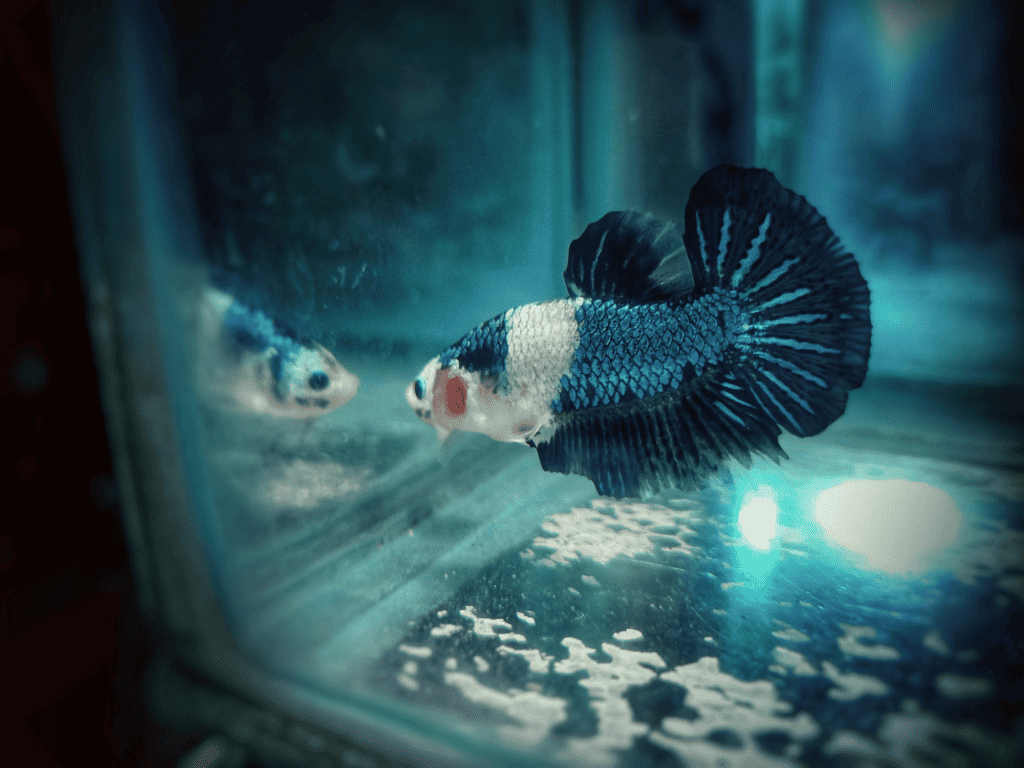
Other Fish Species That Like Blackwater
While bettas are perhaps the most commonly known, there are numerous other species that thrive in blackwater environments. If you’re considering adding more diversity to your tank, it’s good to know some other blackwater-loving fish.
- Tetras: Many species of tetras, such as Neon Tetras and Cardinal Tetras, hail from blackwater environments and can do quite well in them.
- Discus: Discus are another species known to thrive in blackwater conditions. They benefit from the softened water and lower pH levels found in blackwater setups.
- Rasboras: These small, peaceful fish are great companions for bettas and are accustomed to blackwater environments in the wild.
- Corydoras: These bottom dwellers enjoy the softened water and acidic pH typical in a blackwater aquarium.
Remember, if you plan on adding other species, make sure their temperaments, size, and specific needs are compatible with your bettas.
Betta Adaptation to Blackwater
When transitioning your betta to a blackwater environment, it’s important to monitor them closely to ensure they’re adapting well. Remember, changes to their environment should be introduced gradually.
Most bettas adapt to blackwater conditions within a week or two, but individual responses can vary. Initially, they may show signs of stress such as loss of appetite or decreased activity, but this is typically temporary. As they become accustomed to the new conditions, their normal behaviors should resume.
Bettas that are thriving in a blackwater setup may show improved coloration and activity levels, indicating that they’re benefiting from the environment. If, however, your betta’s stress signs persist or they show signs of illness such as clamped fins, gasping at the surface, or spots on their body, consider consulting a vet or an aquatic expert. It’s possible that the change in environment may not suit every individual betta.
Conclusion
In conclusion, while bettas do not necessarily need blackwater to thrive, some may benefit from the addition of blackwater to their tank. Blackwater can help to reduce stress and promote a healthy immune system.
It also contains natural bacteria that can help to keep your betta’s tank clean. If you want to give your betta the benefits of blackwater, there are a few different ways to do so.
You can add Indian Almond Leaf (IAL), driftwood, or blackwater extracts to your tank. Be sure to follow the instructions on the bottle, as too much extract can be harmful to your fish.
Thanks for reading. Do you have any questions or comments about blackwater and bettas? Leave them in the comments below!
FAQs about Bettas and Blackwater
Q1: Is blackwater safe for all betta fish?
A: Generally, yes. Bettas originate from environments where blackwater conditions are common. However, individual bettas may react differently. Always monitor your betta closely when introducing changes to their environment.
Q2: How quickly can I transition my betta to a blackwater tank?
A: It’s important to make the transition gradually, over a period of one to two weeks. This gives your betta time to adjust to the new conditions and minimizes stress.
Q3: Can I use tap water to create a blackwater environment?
A: Yes, but make sure to treat the water to remove chlorine and other harmful chemicals first. The addition of Indian Almond Leaves, driftwood, or blackwater extracts can then help achieve blackwater conditions.
Q4: Will blackwater harm my aquarium plants?
A: Not typically. In fact, many plants thrive in blackwater conditions. However, some plant species prefer different water parameters, so always research your plants’ specific needs.
Q5: Can I keep other fish with my betta in a blackwater tank?
A: Yes, as long as the species are compatible in terms of behavior, size, and environmental needs. Many species such as certain tetras, rasboras, and discus can thrive in blackwater conditions.
Q6: Will the blackwater stain my aquarium or equipment?
A: The tannins in blackwater can potentially cause staining over time, especially on silicone seals and light-colored decorations. Regular maintenance and cleaning can help prevent this.
Q7: Is blackwater the same as dirty water?
A: No, blackwater is not dirty. It is simply water that has a high concentration of tannins and other dissolved organic materials. It may look dark or tea-colored, but it should not be cloudy or foul-smelling.
Q8: How often should I change the water in a blackwater aquarium?
A: This largely depends on the size of your tank, the number and type of inhabitants, and the degree of filtration. However, a general rule of thumb is to change 10-20% of the water weekly.
Q9: Does a blackwater environment affect the temperature requirements for my betta?
A: No, the temperature requirements for bettas remain the same regardless of whether they are in a blackwater or clear water environment. Bettas thrive in water temperatures between 78 and 82 degrees Fahrenheit (25.5-27.8 degrees Celsius).
Q10: If my betta appears stressed in a blackwater environment, what should I do?
A: Return them to their original water conditions gradually, just as you introduced the blackwater. If stress signs persist, consider seeking advice from a vet or aquarium specialist. Remember, not every betta will respond positively to a blackwater environment.
